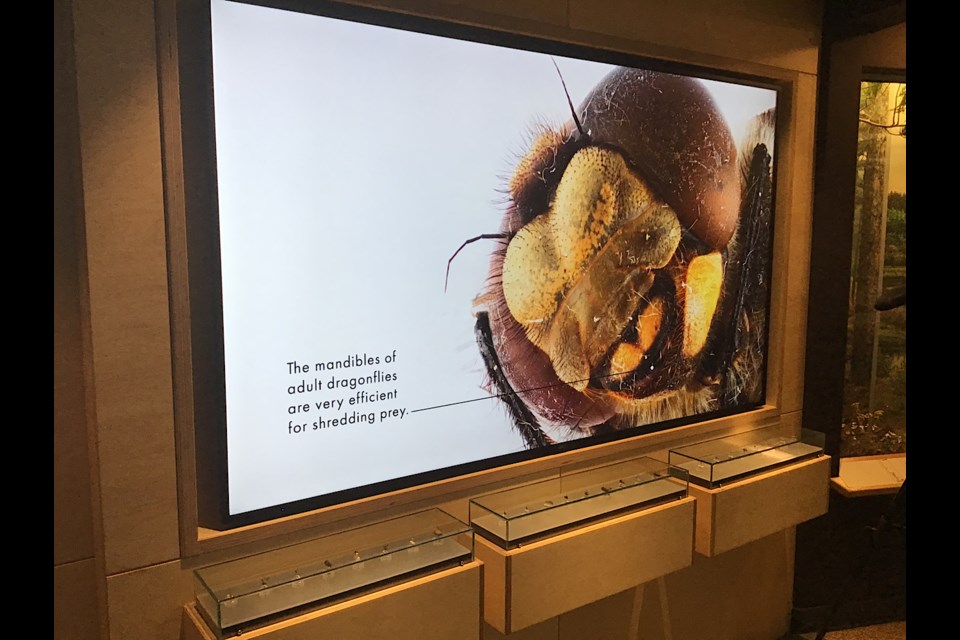REGINA - If you’re interested in flying objects, whether they are bugs or birds, this is a prime week to go down to the Royal Saskatchewan Museum.
A few exhibits are on display at the museum this Easter break. One is the recently opened Take a Closer Look exhibit, which takes the RSM in a different direction. In a departure from some of their other exhibits spotlighting some of the largest animals ever to roam Saskatchewan, this focuses on the smallest — those being insects.
It includes a number of specimens of the insects which range from dragonflies to beetles to scorpions, to even a rare bee on the endangered list that recently was discovered in the province.
The display also features photographs of the insects taken through a digital imaging system, allowing people to get a closer look at each of the insects.
"With this here what we really wanted to do was give visitors to the museum a chance to appreciate the diversity of insects in the province," said RSM Curator of Invertebrate Zoology, Dr. Cory Sheffield.
One of the challenges to putting together the exhibit was the fact that these insects were so small and so they couldn’t show them in their habitat the way they could for the larger animals displayed at the museum.
“What we wanted to do was change that by having something that focused specifically on those insects,” said Sheffield. He said each of the insects in the pin specimens are included in large images above to give people that sense of detail of what their features are.
The insects that were chosen were meant to reflect both the diverse regions of the province as well as the diverse features of the bugs themselves.
“The specimens we chose were sort of, I guess, not necessarily a little bit of Fear Factor… but each item we have a little bit of a story to tell,” he said. One beetle featured in the exhibit has eyes that are split in two to allow them to have vision both above and under water.
Minister of Parks, Culture and Sport Laura Ross was at the museum Monday to check out the exhibit and help promote the opportunities at the museum coming up this Easter.
"The exhibit Take a Closer Look is a really good opportunity for visitors to see the insects across the whole province," said Minister Ross. "When they put together the display they ensured that different regions of our province are displayed in the exhibit, so it’s kind of cool.”
It’s also a great opportunity, she said, for families to visit the museum and “not just have fun but learn a lot when they leave.”
As for which of these insects she finds most interesting, Ross points to the dragonflies. “I love the diversity and the job that they do.”
When asked which of these insects she thought she could beat in a fight if it were human-sized, Ross said she would probably take on a dragonfly or a butterfly, “as opposed to a bee with a big stinger. No thanks!”
The insect exhibit will be a permanent part of the museum. Not so permanent is what is happening in the Learning Lab, which is hosting All About Eggs from March 30 to April 7 between 1:30 p.m. and 3:30 p.m. each day.
Currently, staff at the museum have been incubating a number of chicken, duck and geese eggs since March 8. The baby chicks should be hatching or have just hatched around the same time that All About Eggs runs, so visitors and kids can drop by and can get to interact directly with the chicks themselves. The chickens take 21 days to hatch, the ducks 24 days and the geese 30 days.
All the eggs are locally-sourced from Fenek Farms which will be taking the animals back to their farm after they have hatched; the farm also donated the incubator equipment.
There are also a number of diverse examples of eggs on display there, including both a large ostrich egg and a tiny hummingbird egg side-by-side. Most of the eggs are Saskatchewan bird eggs.
It is not usual for people to find these eggs in nature. Ryan Fisher, Curator of Veterbrate Zoology at RSM, said it is “very rare that you’ll actually see a lot of the eggs that we have here out in the wild. You really can’t go out and move a bird out of its nest and pick up the egg and have a look at it.
"So this opportunity really to see all of them together… you can see the different colours, you can see the different sizes. It really gets people interested in birds and eggs and sort of what the birds are doing at this time of year. All of the birds are coming back, they’re starting to nest, they’re starting to lay eggs, so it’s the perfect time of year to learn about eggs.”
Those are some of the goings-on at the RSM during the Easter break. Also happening around the same time that the eggs are on display will be the Scotty's Dino Egg Hunt, where visitors can search for "dino eggs" hidden throughout the galleries.
Entrance to the Royal Saskatchewan Museum is by donation, recommended at $5 per person.




